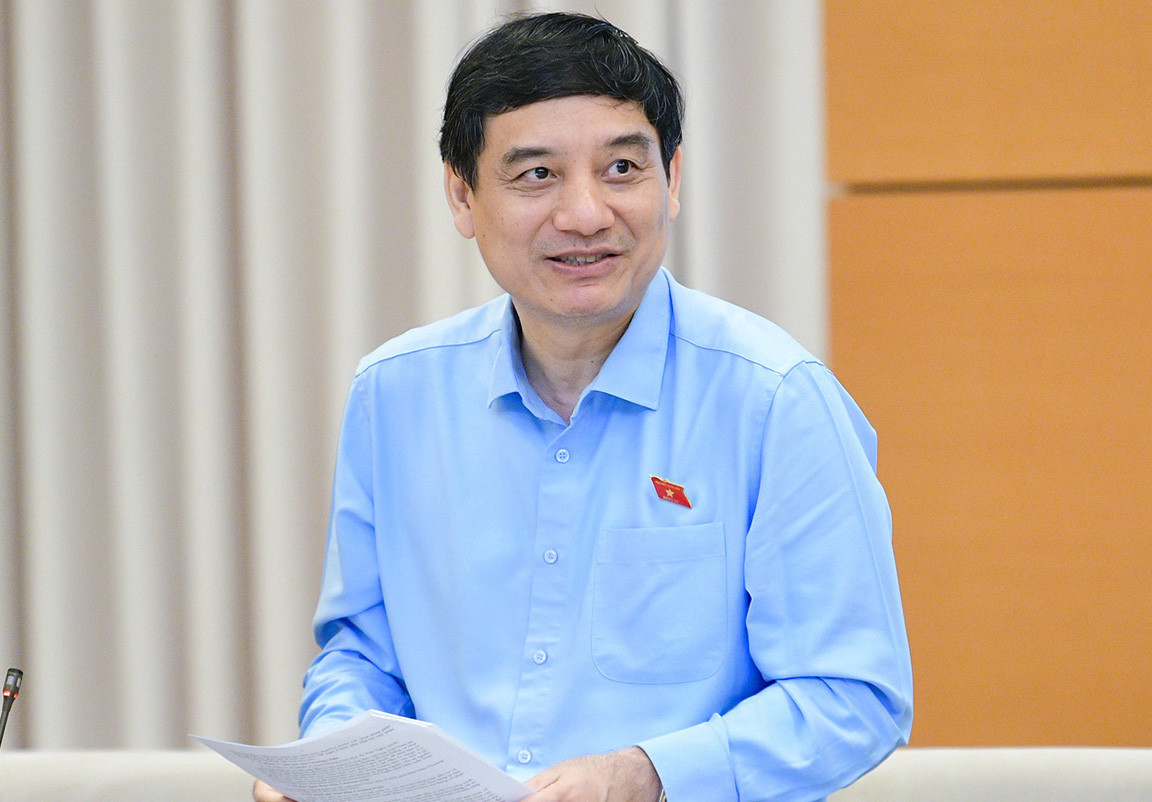According to National Assembly Chairman Tran Thanh Man, there should be further research into models of "doing without money is even better" in cultural development, especially given the country’s current challenges.

On the morning of October 8, the National Assembly Standing Committee provided feedback on the investment proposal for the National Target Program on Cultural Development for the 2025-2035 period.
Presenting the government's report, Deputy Minister of Culture, Sports, and Tourism Trinh Thi Thuy stated that the total mobilized resources to implement the program for 2025-2030 are expected to reach VND 122.25 trillion.
This includes a minimum central budget allocation of VND 77 trillion (63%), with VND 50 trillion for development investment and VND 27 trillion for recurring expenditures.
Local budget contributions will amount to approximately VND 30.25 trillion (24.6%), with VND 18 trillion for development investment and VND 12.25 trillion for recurring expenditures.
An additional VND 15 trillion (12.4%) will come from other legal sources of mobilization.
The total expected resources for the 2031-2035 period are VND 134 trillion.
How will VND 400 billion allocated for 2025 be spent?

Reviewing the proposal, Chairman of the National Assembly’s Committee for Culture and Education Nguyen Dac Vinh expressed general agreement with the projected total investment and the sources of funds for the program’s implementation.
The government's proposal to allocate significant resources for this program aligns with the Party’s views and policies on cultural development.
However, some voiced concerns that the total investment for this program is substantial compared to previously implemented national target programs for culture and considering previous periods' disbursement capacity.
Thus, it is necessary to thoroughly research and assess the scale, structure, and mobilization capacity of resources to ensure the program's feasibility, aligning with national resource capabilities, effectively using the budget, and submitting the findings to relevant authorities for consideration and decision.
Vice Chairman of the National Assembly Nguyen Khac Dinh suggested reconsidering the allocation of funds for 2025. He pointed out that by the time the National Assembly approves the program in November 2024, the budget will be allocated in December 2024, leaving little time to utilize it in 2025.
"How will the VND 400 billion (allocated for 2025) be spent? I don’t think it will be possible to use any of it. If even allocating it is difficult, how can VND 400 billion be spent in 2025, from both central and local budgets?" Dinh questioned.
Additionally, Dinh noted that 2025 should focus on policy frameworks in preparation, making investment implementation challenging. Developing policy frameworks for three other national target programs has taken two years.
"I agree with allocating funds for 2025, but can they be allocated and used? The regulations must be feasible - it’s easy to talk for the sake of talking," the Vice Chairman emphasized.
According to Dinh, the next five years should focus on cultural development. Priority should be given to sectors that "don’t require much budget" yet still foster growth. Furthermore, attention should be directed toward cultural industries to increase revenue, allowing culture to support itself.
Dinh also cautioned against excessive construction spending, as it’s difficult to determine how much is enough.
"Building something without ensuring its effectiveness is not worthwhile. Preservation and restoration of museums and relics are essential, but avoid creating unnecessary, grandiose structures that end up unused," he advised.
"Doing without money is even better"
Chairman of the Finance and Budget Committee Le Quang Manh acknowledged that the proposed budget is substantial compared to other national target programs. However, he emphasized that this program has significant importance, with far-reaching impacts on the country and the Vietnamese people, making it necessary.
Reflecting on past budget use and public investment in the cultural sector, Manh expressed concerns about disbursement capacity. He highlighted the challenges faced during previous national target programs for culture.
From 2012-2015, the national target program had a budget of VND 7.968 trillion, but only VND 1.786 trillion was utilized. From 2016-2020, VND 10.62 trillion was projected, but only VND 2.7 trillion was disbursed.

Manh pointed out that large infrastructure projects disburse funds more effectively, as there are clear spending benchmarks, making disbursement easier. However, cultural projects, which require high standards, make disbursement more challenging, even for budgets of just a few tens or hundreds of billions of VND.
"This is why we’re concerned about the large-scale budget, while in reality, disbursement has been difficult," Manh explained.
He also noted that a program of this scale requires more than a year to prepare an investment framework. "Good preparation ensures effective disbursement, and this is a challenging program requiring a multi-dimensional approach," he added.
Agreeing with the focus on sectors that "don’t require much budget," National Assembly Chairman Tran Thanh Man cited the ancient town of Hoi An, which attracts a large number of tourists without significant public investment.
"Hoi An doesn’t rely on the state budget but still manages to draw in a crowd, creating a brand both locally and internationally," Man emphasized, suggesting that Vietnam has many places like Hoi An that could benefit from similar models.
Additionally, Man urged the program to pay attention to grassroots cultural development. "Recently, there’s been a push to build cultural houses in villages and districts, but we should evaluate whether they are truly effective," he said.
According to Man, grassroots cultural development is an area where "you can accomplish a lot without spending money." Building grassroots culture is about raising awareness and fostering a new generation of Vietnamese citizens.
He cited the example of the National Great Unity Day organized by the Vietnam Fatherland Front as an excellent model. Thus, he called for further research into models that "can be done without money," particularly given the country’s current economic difficulties.
Thu Hang